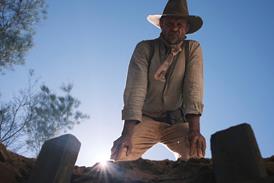"When I was growing up in Florence, we did not have any air-conditioning, so two or three evenings a week we used to go to an outdoor cinema with our mother. As an act of rebellion, I told my parents I wanted to become a film-maker. I started out as a freelance photographer and founded a group of photographers. Then I started making documentaries and eventually we started the documentary film festival of Nyon, Switzerland."
I was very lucky to be called to Locarno, because in those years it was the only functional festival [in an Italian-speaking country]. Venice was in a complete crisis, there wasn't even a competition any more. When I resigned from Locarno [in 1977] I thought of doing something completely different like taking over my parents' business.
However, I was suddenly called to Berlin. They needed someone at a very delicate moment, someone who had good relations with the East and the West. And it happened that Locarno was the first film festival in the world to recognise East Germany. As a foreigner - I had become a Swiss national - I could move around much more easily between Moscow and Washington than a German could.
When I started, you were not supposed to talk much about stars. The only real stars were the film-makers. Today, due to the changes of the press and the impact of television reporting, there is more of a need for glamour in a festival.
A good festival is a balanced festival. Where you have at the same time experimental, difficult films - auteur films - as well as the more entertaining films and the glamour. If you just go one way, you only satisfy one group of people.
I am very proud to have discovered Zhang Yimou, to have shown his first film. I will always vividly remember the time when we got [Russian director] Elem Klimov and [MPAA president] Jack Valenti together, which I would say was the epitome of getting East and West together.
There are also films we missed. For instance, Roberto Benigni's Life Is Beautiful was seen by a colleague of mine when it was at an early stage and rejected. Benigni had wanted to come to Berlin, but he ended up in Cannes.
At the end of my time in Berlin, there was a culture minister who wanted a party friend of his to become the festival's director. After 22 years, I cannot really complain. The only thing I would say is the way it was done was universally recognised as bad taste, bad manners... I mean, Cannes does things much more intelligently. You have to bring in a successor, you have to work with him, he has to get to know all the contacts, it has to be done in a smoother way. That is probably one of the major mistakes Venice has made. The directors come and go, everything is lost with them and you start from scratch. This is ridiculous.
I had five days to think about accepting the job in Venice. I was laughing about Venice like I think everyone was. I never thought they would take anybody but an Italian. So I never looked for the job. One Saturday evening, I get a call from [Biennale head] Franco Bernabe in English. I stopped him and said, "Well you can speak Italian to me." He sounded rather surprised. That is how the whole thing started.
Bernabe told me, "You will have total autonomy, there will be no political interference, I promise you. And if there is politicking, it is my problem, not yours." It was essential that I should hear this. But it was Bernabe's personality that convinced me. What I like about the man was that he is energetic, he seems to have the will to change, to modernise things.
But is it really true Venice wants to make changes' And how fast' There are organisational problems, structural problems. And these have to be tackled, and tackled fast. The Mostra is losing its position with respect to Cannes and Berlin, and it has to get it back. We need more professionals on the staff and greater autonomy for the festival with respect to the Biennale. There are also logistical problems on the Lido. Screening rooms are lacking and there has been a completely wrong policy in the past whereby [the festival] seems to be extremely proud to have reduced its hospitality budget every year. Which is absolutely the wrong thing to do for a festival. You have to get the people there, you have to get the foreign press there. That is the way festivals work.
This year, Venice has a lot of films about the arts, including painting, music and literature. There are also some films that address very, very strong social issues. We are living through a very difficult time and film-makers are interrogating the world in which they are living. There is a kind of general dissatisfaction. But there is no possibility of the situation being different. Our states and economies are so entangled now, and all the problems are international, not national.


















No comments yet